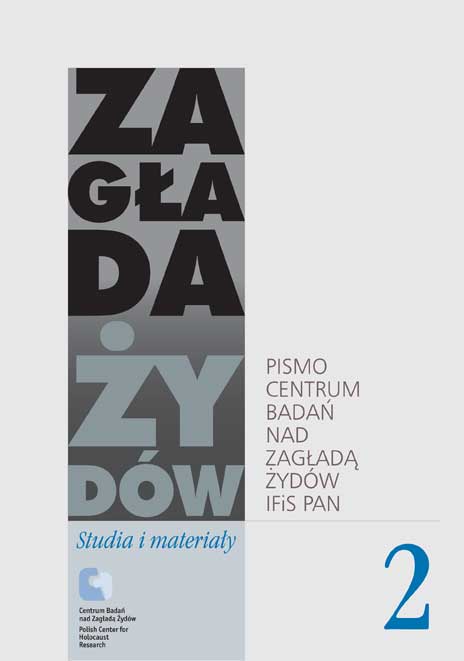Od agenta do kolaboranta? Współpraca żydowskiego publicysty Fritza Seiftera z Bielska z władzami niemieckimi w latach trzydziestych i czterdziestych
Zagłada Żydów. Studia i Materiały, Nr 2 (2006), Strony: 163-176
Data zgłoszenia: 2020-10-11Data publikacji: 2006-12-02
 https://doi.org/10.32927/ZZSiM.185
https://doi.org/10.32927/ZZSiM.185
Abstrakt
Fritz Seifter, a Jewish-German journalist and Polish citizen, collaborated with the German authorities on two occasions: first during 1933–1934 in Bielsko, where, supported by the Reich Ministry of National Education and Propaganda, he launched his newspaper Jüdische Wochenpost; second, in July 1940, when the General Governor's Department of National Education and Propaganda in Cracow appointed him editor-in-chief and managing director of Gazeta Żydowska. But in either case the circumstances and motives for collaboration differed significantly.
In the case of Jüdische Wochenpost, Seifter completed a project he had been planning to carry out since the late 1920s. His newspaper was to consolidate the bonds of German-speaking Polish Jews with Germany. The Reich Ministry of National Education and Propaganda supported the establishment of this newspaper in order to tone down the opinions of Polish Jews regarding the Nazi regime in Berlin. During 1933–1934 Seifter saw himself as an agent of the German Ministry of Propaganda.
In 1940, German occupation authorities in Krakow searched for and found Fritz Seifter, who was to be appointed editor-in-chief and managing director for the German-planned Gazeta Żydowska, completely controlled by the Germans. Its principal aims were to isolate the Jews even further from their Polish environment, herd them to work and give illusions of hope for emigration after the war.
Thus there was no continuity in Seifter's co-operation with the German authorities, and collaboration was not the case. During 1933–1934, Seifter's main reason to launch his newspaper was German nationalism, which ostensibly linked him to the Germans. In 1940, however, Fritz Seifter no longer acted of his own accord, and any illusions as to the genocidal character of the Nazi regime was out of the question: Seifter alongside the rest of Polish Jews wanted only to survive.
Słowa kluczowe
Friedrich Seifert , stosunki polsko-niemieckie , stosunki niemiecko-żydowskie , prasa codzienna , propaganda , narodowy socjalizm , okupacja , kolaboracja
Licencja
Prawa autorskie (c) 2006 Autor&"Zagłada Żydów. Studia i Materiały"

Utwór dostępny jest na licencji Creative Commons Uznanie autorstwa 4.0 Międzynarodowe.
https://creativecommons.org/licenses/by/4.0
Czasopismo publikowane jest w standardzie Diamond Open Access na licencji CC-BY-4.0 Deed - Uznanie autorstwa 4.0 Międzynarodowa - Creative Commons
Podobne artykuły
- Jakub Petelewicz, „Kresy Wschodnie pod okupacją sowiecką 1939–1941; stosunki ukraińsko-polsko-żydowskie, życie społeczne i wzajemne relacje” , Zagłada Żydów. Studia i Materiały: Nr 3 (2007)
- Jerzy Tomaszewski, Jakub Petelewicz, Jak Polacy patrzyli na getto z zewnątrz z Jerzym Tomaszewskim rozmawia Jakub Petelewicz , Zagłada Żydów. Studia i Materiały: Nr 1 (2005)
- Monika Polit, Pomiędzy propaganda a kolaboracją: casus Getto Cajtung , Zagłada Żydów. Studia i Materiały: Nr 2 (2006)
- Anna Zawadzka, Piotr Forecki, Reguła złotego środka. Kilka uwag na temat współczesnego dominującego dyskursu o „stosunkach polsko-żydowskich” , Zagłada Żydów. Studia i Materiały: Nr 11 (2015)
- Dariusz Libionka, Walka i propaganda. Powstanie w getcie warszawskim z perspektywy polskiego Londynu , Zagłada Żydów. Studia i Materiały: Nr 10 (2014)
- Piotr Forecki, Anna Zawadzka, The Golden Mean Principle. A Handful of Comments on the Currently Dominant Discourse on ‘Polish-Jewish Relations’ , Zagłada Żydów. Studia i Materiały: Nr Holocaust Studies and Materials (2017)
- Małgorzata Melchior, Zagłada i stosunki polsko – żydowskie w opracowaniach socjologicznych. , Zagłada Żydów. Studia i Materiały: Nr 1 (2005)
- Dariusz Libionka, The Fighting and the Propaganda: The Uprising in the Warsaw Ghetto from the Perspective of ‘Polish London’ , Zagłada Żydów. Studia i Materiały: Nr Holocaust Studies and Materials (2017)
- Adam Kopciowski, Przemoc antyżydowska w powojennej Polsce w świetle ksiąg pamięci , Zagłada Żydów. Studia i Materiały: Nr 14 (2018)
- Klaus Peter Friedrich, Nazistowski mord na Żydach w prasie polskich komunistów (1942–1944). , Zagłada Żydów. Studia i Materiały: Nr 2 (2006)
1 2 3 4 5 6 7 8 9 10 11 12 13 14 15 16 17 18 19 20 21 22 23 24 25 26 27 28 29 30 31 32 33 34 > >>
Możesz również Rozpocznij zaawansowane wyszukiwanie podobieństw dla tego artykułu.
 English
English
 Język Polski
Język Polski








